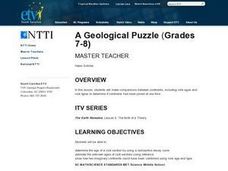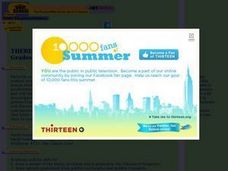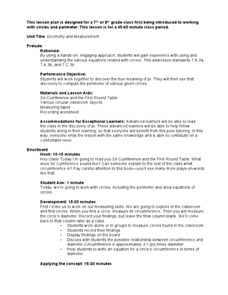Curated OER
The Trapping of Trapezoids
This is a nice hands-on activity where young geometers create trapezoids and calculate their area by looking at areas of quadrilaterals and triangles.
Alabama Learning Exchange
Systems on a Mission
Solve systems of equation problems using four different methods: elimination by addition or subtraction, graphing, elimination by multiplication, and substitution. Middle schoolers are then given a series of "missions" to complete.
Curated OER
Equivalent Algebraic Expressions
This online worksheet can be printed, projected on the board, or used as example problems for the class to solve. They write equivalent expressions for a set of given equations, 14 total. This page contains an answer link and links to...
Curated OER
Anything I Can Do You Can Do Better
Students complete a two-week unit involving design and construction concepts. They watch a PowerPoint presentation about geometric shapes, draw the fourteen shapes incorporated in bridge construction, and in small groups design, build,...
Curated OER
Sizing Up the Supersize Croc
Students examine and compare traits of humans and crocodiles. In this crocodile lesson students use a ratio to estimate the height of a person and compare that to a crocodile.
Curated OER
Don't Crack Humpty
Students investigate the engineering design process and the relationship between distance, time, and speed. Using a generic car base, small groups design a device that will protect an egg on or in the car as it is rolled down a ramp at...
Curated OER
They're Everywhere! They're Everywhere!
Students gain an appreciation of the polygons and polyhedrons around them that make their world one of order and strength. They build polygons and polyhedrons, and then construct airplanes out of polygons.
Curated OER
Polymer
Students investigate polymers by completing 3 experiments. In this polymer lesson plan, students mix plastic with acetone, they create polyurethane foam, they make slime and build a polymer model once their polyurethane foam is set. ...
Curated OER
Surveying our First President
Students act as surveyors. For this George Washington lesson, students read transcriptions from Washington's surveying journal and then try surveying skills on their own.
Curated OER
A Geological Puzzle
Students compare and contrast the various types of rocks on each continent. In groups, the calculate the rock ages and types to determine if the continents, in their opinion, were joined at one time. They develop two imaginary...
Curated OER
Flambe Elements
Eighth graders discuss atoms and electrons as well as atoic structure. They view atomic structure via the computer. Students watch a demonstration in which the teacher demonstrates glass tubing turning yellow in a Bunsen Burner flame....
Michigan Sea Grant
Fish Identification
Using a dichotomous key, pupils identify characteristics of fish who live in the Great Lakes and explain how these features help them survive. In small groups, class members discover what features scientists consider important and...
Curated OER
Candy Land
In this activity students pretend that they have been hired by a candy manufacturer to design a box for a new product they are beginning to market. The manufacturer has pre-determined the volume of the candy box. It is the students' job...
Curated OER
Planet Paths: Studying Planetary Orbital Paths
Middle schoolers define and identify planetary orbit, ellipse, parabola, and hyperbola, and simulate Kepler's Second Law. They explore interactive websites demonstrating orbital motion and complete modeling activities.
Curated OER
There's Gold in Them Thar Ratios
Students draw a model of the bunny problem which generates the Fibonacci Sequence, spirals generated from golden rectangles and golden triangles; identify the golden ratio in the human body, and find the Fibonacci numbers in nature.
Curated OER
Is the Hudson River Too Salty to Drink?
Students explore reasons for varied salinity in bodies of water. For this geographical inquiry lesson, students use a variety of visual and written information including maps, data tables, and graphs, to form a hypothesis as to why the...
Curated OER
Rectangles and Trapezoids in the Coordinate Plane
Students determine the missing vertices of quadrilaterals. In this rectangles and trapezoids lesson, students examine the characteristics of quadrilaterals. They identify the missing vertices of a quadrilateral on a coordinate plane.
Curated OER
My Perfect Partner
Students explore gender roles by describing an ideal partner. In this human characteristic lesson, students create a chart which describes the positive and negative aspects they seek in a partner of the opposite sex. Students demonstrate...
Curated OER
Squares, Square Roots, and Exponential Expressions
Students explore the concepts of square roots and exponential expressions. In this square root and exponential expression lesson plan, students complete an investigation called Building A Square Patio. Students use color tiles to develop...
Curated OER
Math: A Geometric Neighborhood
Learners, as a final project, draw a picture of their ideal neighborhood on a sunny day. In addition to the sun, their drawings include homes, trees, streets, and selected objects. Each object in their drawing has a written description...
Curated OER
Density of a Sinker
Eighth graders determine the density of a sinker by first finding the mass and then the volume using a graduated cylinder. Students must write the procedure they use to find the volume of the sinker then apply their data to follow-up...
Curated OER
Oil Spill
Students use one of four absorbent products to separate as much of the oil and water mixture they are able to do. The purpose of this task is for students to collect and analyze data for the purpose of determining which absorbent is...
Curated OER
Slope Right Up
Students use triangles to find the length and slope of each side. After connecting the vertices, they add points based on their specific instructions. They use the Pythagorean Theorem to complete a worksheet to end the lesson.
Curated OER
Geometry and Measurement
Students view a right triangle displayed by the teacher. Students measure legs and the interior angles of the triangle. They look for a pattern or relationship between the legs and angles. Students use pegboards and string to create more...

























